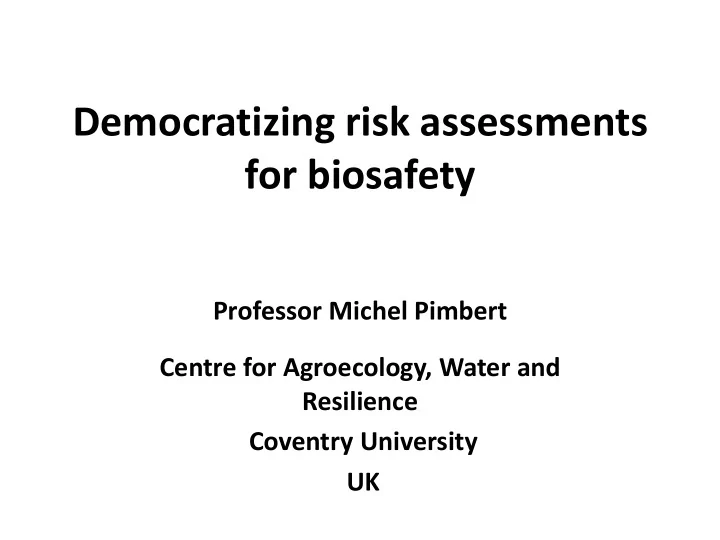

Democratizing risk assessments for biosafety Professor Michel Pimbert Centre for Agroecology, Water and Resilience Coventry University UK
Growing doubts about validity of biosafety risk assessments • Increasing uncertainty and complexity The traditional approaches of risk management and cost benefit analysis are inadequate ‘when we don’t know what we don’t know’ and where ‘ we don’t know the probabilities of possible outcomes ’
• Lack of trust in professional expertise and science people in industrialised and post-industrialised countries no longer view science as representing certain knowledge recent crises over BSE (‘mad cow disease’) and GMOs have seriously undermined public confidence in scientific expertise evidence of collusion between some key government scientific experts and the commercial interests of industry.
Widespread corporate influence on scientific research and policy • Union of Methods of abuse: Concerned • Corrupting the Science Scientists describes • Shaping Public Perception 100 examples of • Restricting Agency corporate Effectiveness interference with • Influencing Government science in USA • Influencing Judicial • 2012 UCS report System Heads They Win, Tails We Lose
A need to expand democracy in risk assessments for biosafety • Crisis of political legitimacy . In many countries, representative democracy has been heavily criticized for its inability to protect citizens’ interests • Human rights and citizen empowerment democratic accountability enhanced when the policy making and the design of technologies involve inclusive deliberation ‘human right’ to participate, - as citizens -, in policy decisions and risk asessements
Democratizing risk assessments Democratising science and technology research and more funds for public system • Strengthen horizontal networks of farmers & citizens for autonomous research, learning and action
Democratizing public research & risk assessments Reforms by governments to: • protect scientists from retaliation and intimidation by corporations • make government more transparent and accountable • reform the regulatory process • and strengthen monitoring and enforcement against corruption and privatisation of science
Democratizing public research & risk assessments • Advocacy for more funds for public research & risk assessments • Citizen/farmer participation in research and its governance – setting upstream priorities; co- production of knowledge; risk assessments… • Methods for citizen participation in risk assessments e.g. citizens’ juries
GMO risks in Mali
Institutionalizing citizen participation in national risk assessments • Presupposes: Cognitive justice between different knowledge systems Transforming research organizations (culture, operational procedures, incentives and rewards, ways of working … )
Strengthening self-managed research and grassroots risk assessments • Strengthening farmer networks for research and horizontal spread of grassroots research & risk assessments • Give farmers/citizens enough material security and free time to engage in and participate in the entire research and risk assessment cycle
Strengthening self-managed research and grassroots risk assessments • Horizontal networks of farmers and citizens producing knowledge in fields, workshops, villages and ‘living campuses’ Campesino a campesino movements in Central America and Cuba Citizens victims of pollution developing a peoples’ epidemiology in Europe Global open source community developing new computer software
Peoples’ biosafety risk assessments: key processes • Horizontal networks and decentralized knowledge production in rural and urban areas • Critical adult education – e.g. Paolo Freire inspired pedagogies for Farmer Field Schools • Dialogo de saberes – dialogue of different knowledges and ways of knowing • Production of practical and political knowledge • Extended peer review to validate knowledge on risks etc • A process that strengthens local organisations and federations
Merci! Thank you!
Recommend
More recommend